Samsung Galaxy Nexus & Ice Cream Sandwich Review
by Brian Klug & Anand Lal Shimpi on January 18, 2012 1:34 PM ESTBattery life remains the other big axis on which smartphones are judged, and here we've turned to our regular 2011 suite of battery life tests to see how the Galaxy Nexus shakes out. Our battery life testing consists of a page loading suite which loads through a few dozen pages endlessly on both WiFi and cellular data until the phone dies, with the display set at 200 nits. For the cellular tests, we're always careful to test in cellular environments with decent signal (at least -75 dBm or higher) as well, since that's a factor. Next is a simple call test where we play music at both ends of a call until the device under test dies, and our final test is a WiFi hotspot workload which consists of four page loading tabs and a 128 kbps streaming MP3 station that runs until the phone dies.
First up are the web browsing tests over cellular 3G; this means EVDO Rev.A for the CDMA/LTE version, and WCDMA T-Mobile for the GSM/UMTS device.
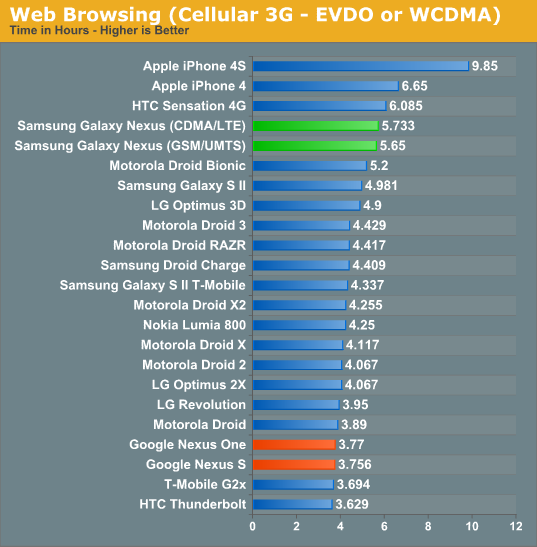
The Galaxy Nexii both do surprisingly well. I'm actually very impressed with how long the devices lasted subjectively on 3G and this definitely backs that up. Of course, both devices include beefy batteries, but Samsung has done a nice job thus far including big batteries without making devices bulky or heavy.
Next up is the same test, but on 4G LTE for the CDMA/LTE variant.
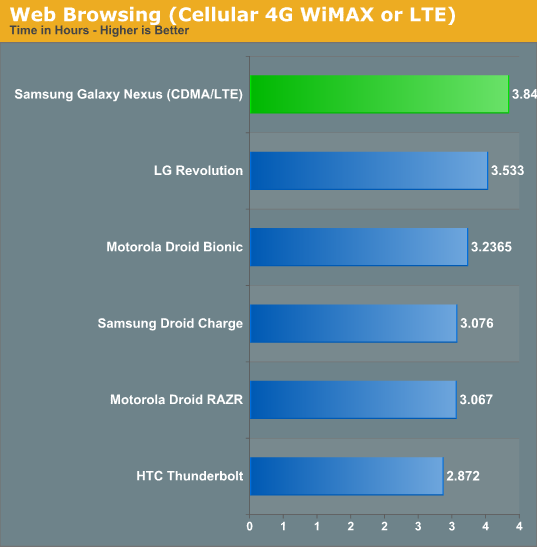
The Galaxy Nexus doesn't post numbers very far in front, but manages to come in the top of the pack on 4G LTE at just under 4 hours. This is a pretty impressive result, honestly, considering that CMC221 is likely made on the same 45nm manufacturing process as CMC220. Again, I'm impressed with the Galaxy Nexus' longevity even on 4G LTE.
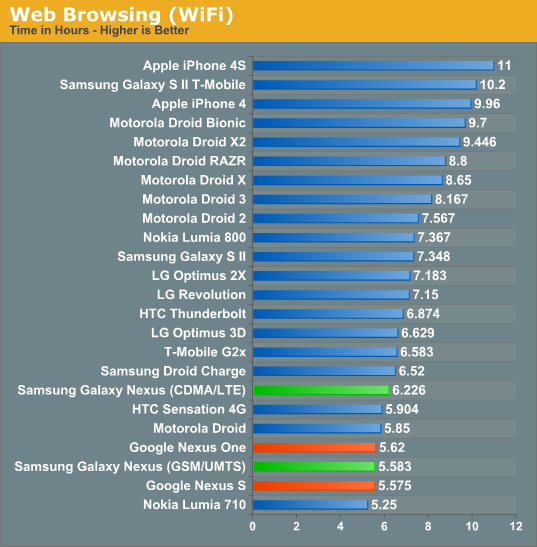
Surprisingly, the Galaxy Nexus can't break past that 6 hour mark even on WiFi, however, which does lead me to think we might be constrained by driving that display.
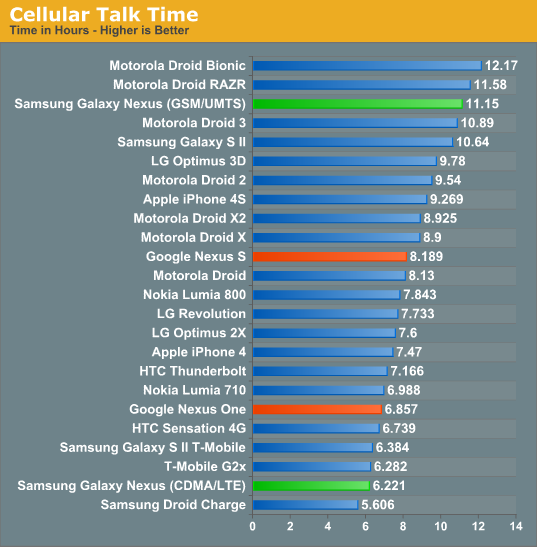
If you ever wanted to see how much difference having a different cellular architecture makes, see above. The GSM/UMTS Galaxy Nexus lasts impressively long on a voice call, at over 11 hours, yet its CDMA/LTE brother lasts just over half that.
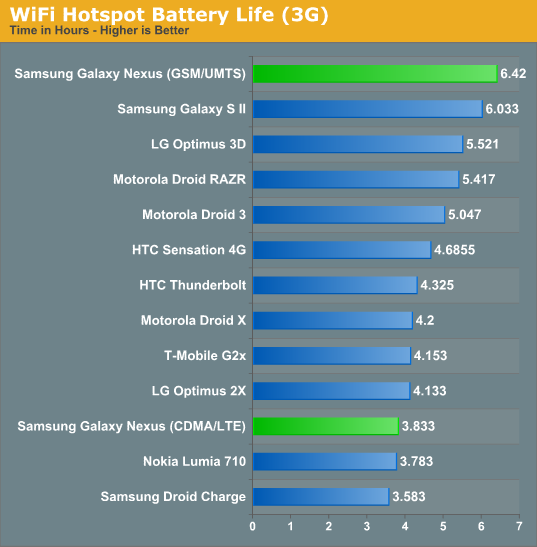
WiFi hotspot on 3G tells the same story - I'm not sure what Via Telecom's CBP7.1 draws in its active state for EVDO or 1x voice, but it seems to eat up more power than the XMM 6260 (X-Gold 626) in the GSM/UMTS Galaxy Nexus.
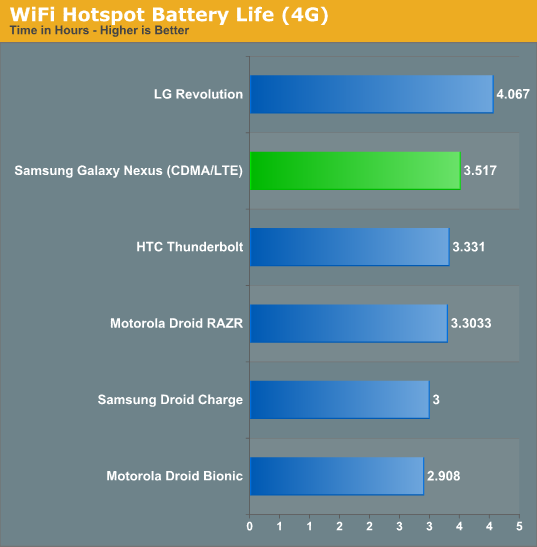
As a 4G LTE WiFi hotspot, the Galaxy Nexus loses its edge over the Revolution, but does come in just ahead of the rest of the 4G LTE herd.
The story of battery life on the Galaxy Nexus unsurprisingly depends on which variant you're talking about. For a phone with a 4.65" display, I'd say I'm impressed with the battery life on both devices - remember that the area that needs to get lit up goes as r^2 - increasing that and not killing the battery is a big feat. In addition, I'd wager that using the OpenGL ES renderpath (and accelerated browser in 4.0) definitely helped both Galaxy Nexus devices post impressive scores. As for the two variants, the GSM/UMTS device has impressively long battery life pretty much across the board. Playing with that phone, I was rarely wanting for more on my regular use schedule (I charge at night on my nightstand). We've seen XMM6260 before in numerous devices where it seems to be a pretty good citizen.
The CDMA/LTE variant, on the other hand, depends strongly on what air interface you end up using most - on 4G LTE the device comes in at the front of the pack usually, and its 3G web browsing test is above average. However, if you make a lot of voice calls, the phone might not cut it. Unsurprisingly the CDMA/LTE Galaxy Nexus does nothing to dramatically change 4G LTE battery life - for that we're still waiting for upcoming 28nm LTE basebands.










185 Comments
View All Comments
TedG - Wednesday, January 18, 2012 - link
I am looking forward to ICS on my RAZR. It seems similar in power and size to the Nexus.Jonathan Dum - Wednesday, January 18, 2012 - link
Any comments on the quality of the touch sensors? My biggest gripe with my Nexus One is the absolutely inane touch accuracy in comparison to an iPhone. If these new ICS phones have significantly improved touch sensors, I may be coaxed into sticking with Android.jalexoid - Wednesday, January 18, 2012 - link
Synaptics touchscreen controller on N1 was to blame. Even the HTC's "copy" Desire had a much better touchscreen experience due to a better touchscreen controller.All devices after that should have a really good controller.
tipoo - Thursday, January 19, 2012 - link
Same with my Nexus S. The locational accuracy is good, but it actually senses a tap with my finger a few millimeters above the screen, which can cause problems with the keyboard and other precise apps.Brian Klug - Thursday, January 19, 2012 - link
That was always my bug with the Nexus One as well, and it remains an unsolved problem to this day on that phone.I've seen no touch recognitions at all on the Galaxy Nexus. For the most part honestly these issues have gone away as the OEMs stopped being cheap with their capacitive layers and controllers. The Nexus One was especially bad.
I've seen some people complaining about issues with recognition in the bottom right corner - hardware swaps fix those problems.
-Brian
Skiddywinks - Wednesday, January 18, 2012 - link
... is the GN still going to be the best Android on the market? I upgrade in March, and it basically comes down to the S2 or the GN. Each has their advantages, but personally it largely comes down to the display and the GPU.I like to play emulated games on my phone, but I don't know how they work in terms of whether they are software only, or can GPU accelerate. The better GPU in the S2 doesn't really do much if the GN can play everything else on the market at no apparent deficit. Better display all the way in that case. GN wins.
I'm not liking the lack of mSD in the GN either, though.
BAH. Decisions, decisions.
tipoo - Thursday, January 19, 2012 - link
Yeah, the Mali 400 in the GS2 might benchmark way higher than the Galaxy Nexus, but there are no games that exclusively run on it, or even that have more features on it like Tegra phones. I'd guess that even with its relatively weak GPU the Galaxy Nexus will never leave you wanting in games for the next year or two, and its screen is better. My Nexus S can still play top end games like Shadowgun, and that was built for more powerful tablets. With Android developers aim for middling hardware.medi01 - Wednesday, January 18, 2012 - link
@Android is an OS that, although more closed than many would like, still allows more flexibility than iOS@And that comparing Open Source OS to something as closed as it gets. It is merely "still allows more than iOS", hilarious.
doobydoo - Thursday, January 19, 2012 - link
The openness of Android wasn't being compared to iOS, the flexibility was.Two separate points.
Gwynbleidd - Wednesday, January 18, 2012 - link
Two things, though:1. You wrote "Business is as usual for Windows users as ICS based devices just appear as a drive letter thanks to native MTP support." - that's not true, because of MTP Nexus appears in My Computer in Windows as a multimedia device and does not have a letter assigned, so sadly it's not possible to use traditional file managers like Total Commander to deal with files on it without additional plugins.
2. Did you notice any screen quality issues in your devices? Mine shows ugly pinkish smudges visibly especially on gray backgrounds, here's photo (it's out of focus on purpose, otherwise there would be a rainbow goo on screen):
http://img812.imageshack.us/img812/7794/nexussmudg...
So when scrolling webpages you can see that text is pinkish at the top, then white stripe, then pinkish again... Apparently I'm not the only one having this issue with Nexus, and there is a long thread on xda forum about the same problem with Galaxy Note Screens
http://forum.xda-developers.com/showthread.php?t=1...
A little investigation, maybe? ;)